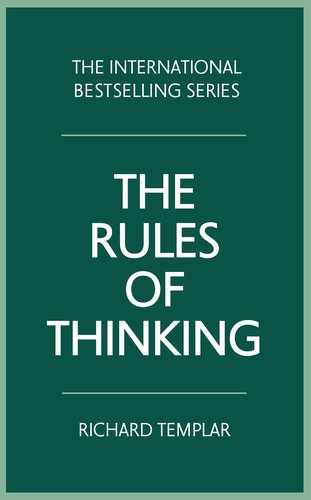RULE 38
Don’t indulge decision making13
Sometimes, organising gets seriously heavy-duty. Perhaps you’ve got a big house move to orchestrate, or there’s a huge product launch at work, or you’re planning a wedding. There will be literally countless decisions you have to make. There’s the big stuff: should we hire in a removal company or do it ourselves, what date should we hold the launch, how many guests should we invite? And it goes right through to the small stuff: do we need to keep this chipped mug, what’s the best font for the name badges, would Aunt Eliza like to be seated next to Louise?
You can spend ages agonising over every one of them, researching them, discussing them, listing their pros and cons, considering all the options. This takes up time – a commodity that is in short supply when you’re this busy – and it can also mess up the whole operation. You can’t book the removal firm until you’ve decided if you want one; you can’t write the press release until you’ve finalised all the relevant details; you can’t send out the invitations until you’ve agreed on the design.
And boy, does it mess with your head. Even with everything we’ve covered in the last few Rules, these things make you feel your brain is under a constant barrage of things to remember, people to call, tasks to tick off, deadlines to meet, decisions to make. So you need to clear as much space as you can in your head, as we know by now (if we’ve been reading these Rules in order). And improving your decision making is one of the best ways to do that.
The fewer decisions you have to wrangle with, the clearer your head, the more time you free up and the less you delay the process waiting for information you haven’t yet agreed or established. Decision making is a luxury you can’t afford when time and schedules are this tight. So don’t do more of it than you absolutely must.
This takes a conscious mind-shift, a recognition that any decision (within reason) is better than one that wastes time and effort you haven’t got. Sift out the really important decisions and give them the time they deserve. Hopefully plenty of them will be quick, however if it’s important you need to give it due consideration. Of course. I’m not suggesting you toss a coin to decide your wedding venue. But, you know, you can decide a lot of other things on the toss of a coin. Shall we box up all the half-used soap and bath oils and shampoo for the new house, or buy new when we arrive? Does it matter? If you don’t know the answer, it’s more helpful just to get on with it and not waste time and head space thinking about it.
It matters that the guest name badges at your product launch look right, but once you’ve narrowed it down to two colours, or three fonts … oh, just hurry up and do it – any of those will look fine. There are more important things to move on to.
This has to be a conscious shift because the decisions you’re glossing over are ones you would have given more time to in other circumstances, so it seems natural to focus on them now. However – think about it14 – they’re not the best use of your time right now.
ANY DECISION (WITHIN REASON) IS BETTER THAN ONE THAT WASTES TIME AND EFFORT YOU HAVEN’T GOT
